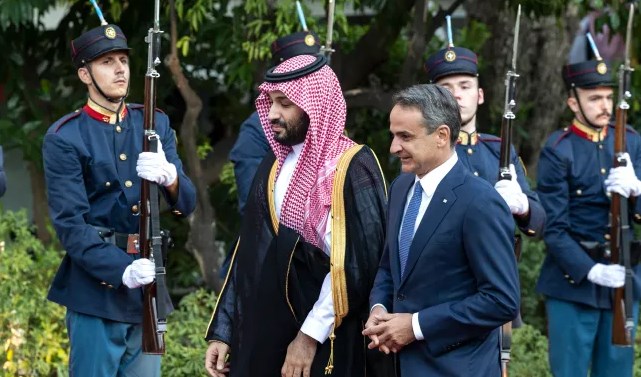Saudi Arabia secretly bribing Greece to host 2030 World Cup: Politico
This deal comes in light of other joint deals competing with the KSA bid: one being a joint Spain, Portugal and Ukraine offer and one from Argentina, Uruguay, Paraguay, and Chile combined.
-

Mohammed Bin Salman (L) and Greek PM Kyriakis Mitsotakis (R) in July 2022. (AP)
In a report by Politico, Saudi Arabia has offered millions for sports stadiums in Greece and Egypt on one condition: if they agree to let Saudi Arabia host three-quarters of the 2030 FIFA World Cup matches.
According to a senior official, the Saudi Arabian de facto ruler, Mohammed Bin Salman, and Greek Prime Minister Kyriakos Mitsotakis convened in July 2022 to discuss the offer and another senior official relaying to Politico that the kingdom is ready to “fully underwrite the costs”.
Even if the offer is accepted, its would be determined by a vote of the entire FIFA Congress.
This deal comes in light of other joint agreements competing with the KSA bid: a joint offer by Spain, Portugal and Ukraine and one from Argentina, Uruguay, Paraguay, and Chile combined.
In December, South America's football chief, Alejandro Dominguez considered that FIFA should honor the legacy of legends Pele and Diego Maradona by awarding the centennial 2030 World Cup to the continent, adding that there should be less focus on "money" in the process.
Saudi Arabia has recently attempted to dominate the sporting world with previous successes like hosting world championship boxing bouts, football, and Formula One motor events.
Additionally, a famous English football club was presented by the kingdom's Public Investment Fund, and it would be hosting the Asian Cup for the first time in 2027.
Simon Chadwick, professor of sport and geopolitical economy at Skema Business School in France said: “Saudi Arabia is strategically trying to position itself as an AfroEurasian hub — the center of a new world order,” adding that "this positioning would enable Saudi Arabia to exert significant power and influence across a vast geographic area, which it is seeking to achieve by building relationships with key partners.”
“The multipolar staging of a World Cup with Egypt and Greece would be neither altruism nor largesse. Rather, it would form part of a wider plan, which the government in Riyadh is enabling through the potential gifting of stadiums,” he concluded.
Another Qatar, another migrant worker injustice
The now-public offer has sparked outrage among human rights activists in light of the unjust treatment of migrant workers - especially after witnessing the same wave of criticism following the 2022 Qatar World Cup.
Unpaid salaries were the most common complaint among migrant workers in Qatar.
Since the ILO opened an office in Doha in 2018, it claims that "significant progress" is observed regarding the living and working conditions for migrant workers whom the country heavily depends on in various fields, even as problems remained with implementing new labor rules.
Read next: Amnesty pleads for FIFA to compensate World Cup migrant workers
Minky Worden, director of global initiatives at Human Rights Watch, expressed: “Saudi Arabian repression should not be rewarded with a World Cup.”
“So long as Saudi Arabia... punishes women for human rights activism, and does not have protections for the migrant laborers who would build the majority of the new stadiums and facilities, the country cannot meet the human rights requirements that FIFA already has in place.”
Racking up investment deals
After the last Olympic games in 2004 in Athens, nearly 30 stadiums remain empty and unused, as the country enters a near-recession. However, Greece's conservative New Democracy government is stepping up efforts to strengthen ties with Gulf countries and Saudi Arabia in retaliation for Turkey's regional policies.
Greece and Saudi Arabia's meeting in July marked the former as the first EU country to be visited by MBS since the slaying of journalist Jamal Khashoggi according to declassified U.S. intelligence.
MBS has gotten Greece on his good side after signing multiple bilateral agreements to make the latter an energy port for the distribution of “green hydrogen.”
As for Egypt, MBS met Egyptian President Abdel Fattah el-Sisi in Cairo in June and marked the signing of investment deals after negotiating “bilateral, regional cooperation.”
The bid's fate is due to be decided upon in 2024, and the official bidding process due to launch this year.

 4 Min Read
4 Min Read








